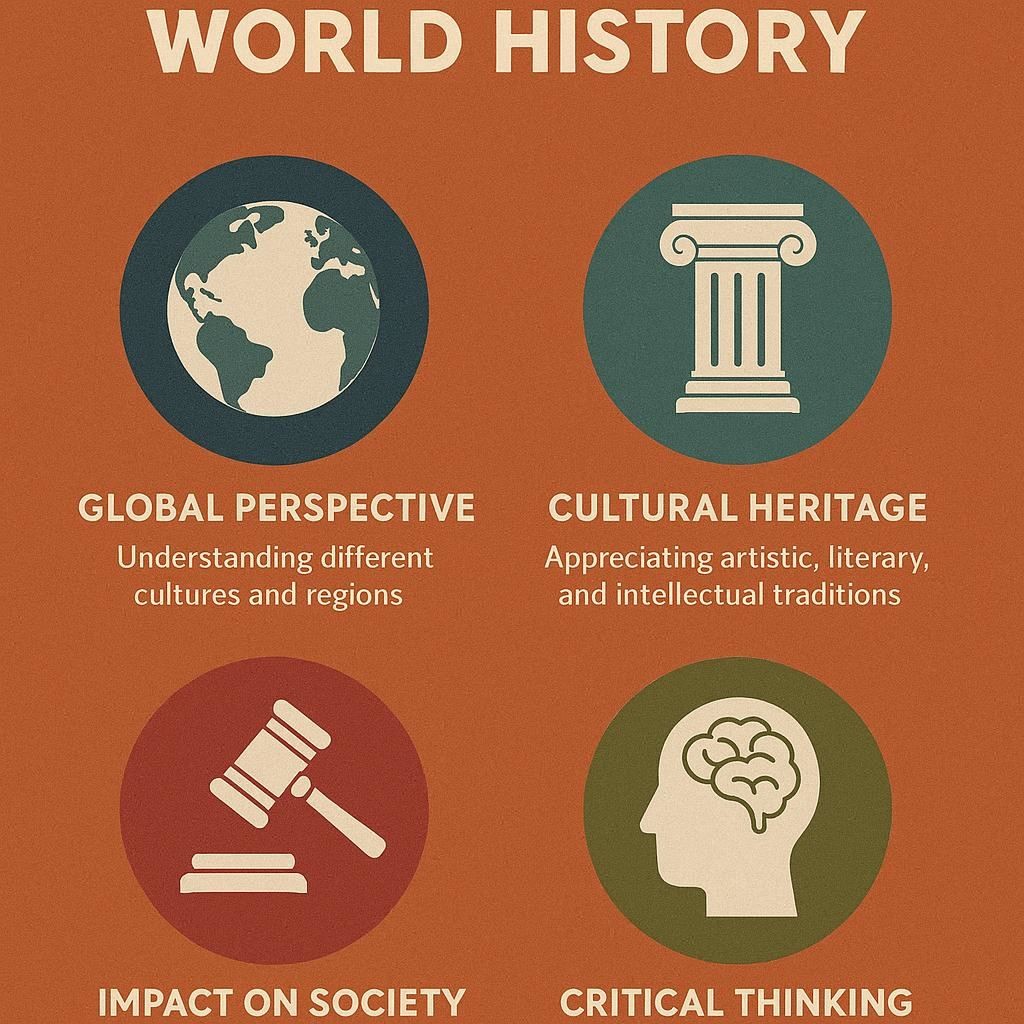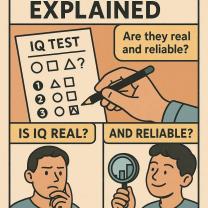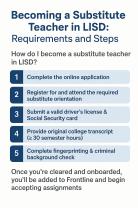Why do you need to study world history?
Why You Need to Study World History: Benefits and Insights
World history is much more than a collection of names, dates, and battles. It’s a lens through which we can better understand ourselves, our societies, and the world we live in today. By exploring the rise and fall of civilizations, the exchange of cultures, and the struggles and triumphs of humanity, we gain valuable lessons that shape our future.
1. Understanding the Present Through the Past
The problems and opportunities we face today are deeply rooted in history. Global conflicts, cultural traditions, and political systems didn’t appear overnight—they were shaped by centuries of events. Studying history helps us understand these roots and make sense of the present.
2. Learning from Successes and Mistakes
History is a record of human choices, both wise and disastrous. By examining leadership decisions, social movements, and historical turning points, we can learn what works, what doesn’t, and why. This helps societies avoid repeating mistakes and encourages better decision-making.
3. Developing Critical Thinking Skills
Studying history isn’t just about memorization. It requires analyzing sources, questioning perspectives, and connecting cause and effect. These skills sharpen our critical thinking and make us better at solving problems in everyday life.
4. Appreciating Cultural Diversity
World history opens the door to different civilizations, philosophies, and traditions. This exposure builds empathy, tolerance, and respect for others, which are crucial in our increasingly interconnected world.
5. Recognizing Global Interconnectedness
From trade routes to migrations and technological innovations, history shows how deeply connected human societies have always been. Understanding these connections prepares us to navigate today’s globalized world with greater awareness.
6. Inspiring Personal Growth
The struggles and achievements of people throughout history serve as powerful inspiration. Their resilience, courage, and creativity remind us of the human spirit’s potential and encourage us to contribute positively to our own communities.
7. Building Informed Citizenship
History provides the foundation for engaged and responsible citizenship. Knowing how rights and freedoms were won helps us value them today and motivates us to protect them for the future.
Conclusion
Studying world history is not just about the past—it’s about the present and the future. It gives us perspective, wisdom, and the tools to navigate modern challenges. By understanding where we’ve come from, we are better equipped to build a more thoughtful, just, and connected world.
Studying world history is crucial for understanding the present, developing critical thinking, and preparing for diverse careers.
Importance of Studying World History
Studying world history is essential because it offers a comprehensive lens through which to understand our present world and anticipate the future.
Understand the Present: History reveals how past events, societies, systems, ideologies, governments, cultures, and technologies have evolved to shape the world we live in today.
Understanding these origins is crucial for comprehending current global, national, and local relationships and challenges. Learn from Mistakes: As the adage goes, "Those who cannot remember the past are condemned to repeat it." History provides a rich tapestry of human experiences, both triumphs and failures, offering invaluable lessons on what works and what doesn't.
Develop Cultural Awareness and Empathy: By studying diverse human experiences, we gain an appreciation for different cultures, ideas, and traditions.
This fosters empathy and helps us recognize the meaningful products of specific times and places, enabling better cross-cultural understanding. Provide Identity: History helps individuals and nations understand their origins, how great institutions were formed, and how they contributed to where we are today.
It connects us to a larger human narrative. Strengthen Civic Awareness: Learning about historical social movements, legal cases, and political shifts helps individuals recognize the impact of civic engagement and encourages active participation in society.
Key Events That Shaped the Modern World
The modern world has been profoundly shaped by a series of transformative events and movements.
World Wars I and II (1914-1918, 1939-1945): These global conflicts dramatically reshaped geopolitical landscapes, led to the rise and fall of empires, spurred technological advancements, and resulted in the creation of international bodies like the United Nations.
WWII also saw the dawn of the nuclear age. The Cold War (1947-1991): The ideological and political rivalry between the United States and the Soviet Union influenced global politics, led to proxy wars, fueled the space race, and shaped the formation of alliances like NATO.
Decolonization Movements (mid-20th century): The widespread independence movements across Asia and Africa after WWII fundamentally altered the global political map and led to the emergence of many new sovereign nations.
The Information and Communications Technology Revolution (late 20th century to present): The invention of the internet, personal computers, and mobile technology has profoundly transformed communication, commerce, culture, and social interaction on a global scale.
Globalization: The increasing interconnectedness of economies, cultures, and populations worldwide, driven by advancements in trade, technology, and transportation, has led to both unprecedented opportunities and complex challenges.
Major Social and Civil Rights Movements: Movements like the Civil Rights Movement in the United States, anti-apartheid struggles in South Africa, and women's suffrage movements globally have significantly advanced human rights and equality.
How Historical Knowledge Influences Critical Thinking
Studying history is inherently a critical thinking exercise.
Evaluating Sources: Historians constantly evaluate primary and secondary sources, questioning their authenticity, provenance, and potential biases.
This practice teaches students to be discerning consumers of information in all aspects of life. Identifying Causality and Multicausality: History helps us understand that events are rarely caused by a single factor. Analyzing historical phenomena teaches us to identify complex interconnections and multiple contributing causes and consequences.
Contextualization: Placing events within their proper historical context prevents anachronistic judgments and encourages a deeper understanding of human values and actions across different eras.
Recognizing Continuity and Change: History teaches us to identify patterns that persist over time, as well as moments of significant transformation, fostering a nuanced understanding of societal evolution.
Integrating Multiple Perspectives: Examining historical events from various viewpoints — considering the experiences of different social, cultural, and economic groups — helps develop a balanced and less dogmatic understanding of the past and present.
Problem-Solving: By studying how past leaders and societies tackled challenges like economic crises, wars, and social conflicts, individuals learn to analyze complex issues, identify patterns, and draw conclusions applicable to modern-day problems.
Integrating World History into Education
Integrating world history effectively into education involves moving beyond rote memorization to foster a deeper, more engaging, and analytical understanding.
Focus on Big Questions and Global Perspectives: Instead of a purely chronological approach, explore overarching themes and "big questions" that transcend specific regions, allowing students to see themselves within a larger global narrative.
Examine history from diverse perspectives, showing how the same event might be viewed differently by various cultures. Humanize History through Stories and Artifacts: Connect students to historical figures and events by using first-person accounts, oral histories, personal artifacts, and narratives.
This helps students relate to the past and understand the human element behind historical decisions. Use Engaging Teaching Strategies: Incorporate interactive methods like debates, role-playing, gamification (e.g., historical simulations), and field trips to local historical sites.
Encourage students to create their own oral histories by interviewing elders in their communities. Leverage Technology: Utilize AI chatbots to "converse" with historical figures, access online databases of primary sources, and use educational videos (under 7 minutes) to make complex topics more accessible and engaging.
Connect to Current Events: Draw explicit connections between historical events and contemporary issues. This helps students understand the relevance of history and how it continues to shape global affairs.
Develop Historical Thinking Skills: Explicitly teach students the methodologies of historical inquiry: how to evaluate sources, identify bias, analyze data, and construct evidence-based arguments.
Careers That Benefit from World History Knowledge
A strong foundation in world history equips individuals with highly transferable skills valued across a wide array of professions, not just traditional historical roles.
Education: Teachers, administrators, and advisors benefit from a deep understanding of historical content and the ability to inspire new generations of learners.
Law: Lawyers, human rights officers, and policy analysts utilize historical knowledge to understand legal precedents, societal changes, and the evolution of governance.
The analytical and research skills developed in history are invaluable for legal reasoning. Business and Marketing: Professionals in these fields benefit from understanding human behavior, identifying long-term trends, and analyzing market evolution. Historical context can inform strategic decision-making in corporate strategy, marketing, and consumer research.
Journalism, Publishing, and Media: Journalists, producers, editors, and documentary makers use historical knowledge to provide context for current events, conduct thorough research, and engage in informed storytelling.
Government and Public Service: Roles in public policy, diplomacy, and intelligence agencies require a nuanced understanding of international relations, cultural contexts, and historical precedents to navigate complex global challenges.
Museums, Archives, and Heritage Work: Curators, archivists, and heritage managers directly engage with and preserve historical artifacts and records, interpreting them for the public.
Non-Profit and International Development: Understanding historical conflicts, socio-economic developments, and cultural dynamics is essential for designing effective humanitarian and development programs.
Technology and Digital Humanities: History majors with an interest in technology can find roles in software development, data analytics, and digital archiving, using their analytical skills to preserve and interpret historical data in innovative ways.
Healthcare: While seemingly unrelated, a historical perspective on public health, medical ethics, and diverse cultural attitudes toward health can help healthcare professionals provide more empathetic and culturally sensitive care.











